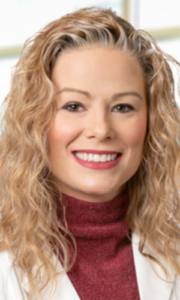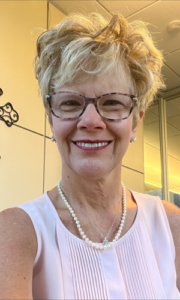An interest in cancer survivorship gave advanced practice providers (APPs) an opportunity to contribute to patient care and the growth of the Oklahoma Cancer Specialists and Research Institute (OCSRI), a large physician-owned practice based in Tulsa, Oklahoma.
OCSRI’s 21 physicians and 18 to 20 APPs, comprising physician assistants, nurse practitioners and clinical nurse specialists, work together to care for more than 600 patients with cancer daily. Approximately 20,000 new patients are seen each year throughout the Northeast Oklahoma organization.
APPs work in all areas at OCSRI including dermatology, radiation, gynecology, breast surgery, supportive care/palliative care, genetic screening, and medical oncology. Two to three advanced practitioners are focused on the management of OCSRI’s acute inpatient population at Ascension St. John Medical Center, also in Tulsa, which promotes efficiency when OCSRI’s physicians round at the hospital.
Shared APP support model
OCSRI utilizes a shared care APP support model in which physicians and APPs take turns seeing patients. APPs conduct an individualized one-on-one teaching visit with patients who are diagnosed with cancer, and then they alternate visits with the physician during treatment. When a patient begins a new regimen, the APP is automatically scheduled to see the patient at the one-week mark for a toxicity check. Following treatment, the APP sees patients for all survivorship visits.
The first survivorship visit is a full hour in which the APP reviews the National Comprehensive Cancer Network (NCCN®) survivorship guidelines, explaining what the patient can expect following treatment, including side effects, recurrences and how often to schedule scans, such as mammograms, or procedures, such as colonoscopies.
OCSRI’s lead advanced practitioner Julie Spears, APRN, CNS, AOCNS, CCNS, DNP, developed the model while working as a clinical nurse specialist at OCSRI. In an interview with The Oncology Connection, Spears described how she was recruited by a physician to work in collaboration to maximize patient visits in an efficient way focusing on survivorship.
“At first it started with me and a physician just kind of experimenting, training with some survivorship visits, figuring out how we want to do it, looking at what worked best, how to get that survivorship care plan or treatment summary. We started out just doing survivorship visits and then still alternating surveillance visits,” Spears explained, noting that the NCCN guidelines recommend seeing the patient every 3 months for a couple of years then every 6 months. Over time, she said, “it got to the point where it made more sense for the physician to see less of the surveillance patients so they could get more new patients started on new treatments.”
After reviewing various survivorship care templates, Spears chose the American Society of Clinical Oncology’s Journey Forward template for their survivorship packets. As part of her dissertation for her doctorate of nursing practice program, Spears conducted a literature review of outcomes of cancer survivorship care provided by advanced practice RNs, which she compared to other models of care.
She found that improved patient satisfaction and quality of life were demonstrated when survivorship care is provided by APRNs, and that incorporating survivorship care plans into health records improved efficiency. Spears’ research served as the foundation for the model of survivorship care provided at OCSRI, in which the advanced practitioner and the physician work as a team, alternating visits.

Interest in survivorship grew
Initially Spears was the only APP doing survivorship visits at OCSRI, but in time interest grew. “We rolled that teach visit into survivorship because depending on whose definition you are looking at survivorship begins at diagnosis. During that first teach visit we’re talking about how we’re going to get them through this, how we’re going to manage their toxicities, what to look forward to, what goals to set,” she said.
Ruth Dunn, RN, BSN, OCN, executive director of clinical operations at OCSRI, explained that survivorship care is reimbursable when provided by APPs, secondary to the ability to bill for services. The demand for oncology services is so high in the Tulsa area that survivorship care “wouldn’t be completed if it was a physician practice only,” Dunn said.
Dunn said she is passionate about the APP role “because they can extend the quality of care that we’re able to provide to our oncology patients and allow our physicians to focus on seeing those new patients, while we can help divert the APP role to toxicity management and all the extended programs that our organization could not operate without the support of APPs.”
Dunn described OCSRI’s APPs, who each see approximately 20 patients per day, as essential to the practice’s financial viability. “Unlike oncology practices in academic settings, we don’t have a foundation that’s backing us; we don’t have a university backing us; we don’t have a hospital that’s backing us. Our revenue depends on our physicians and our APPs seeing patients,” she said.

For more information
Spears, J. A., Craft, M., & White, S. (2017). Outcomes of Cancer Survivorship Care Provided by Advanced Practice RNs Compared to Other Models of Care: A Systematic Review. Oncology nursing forum, 44(1), E34–E41.







